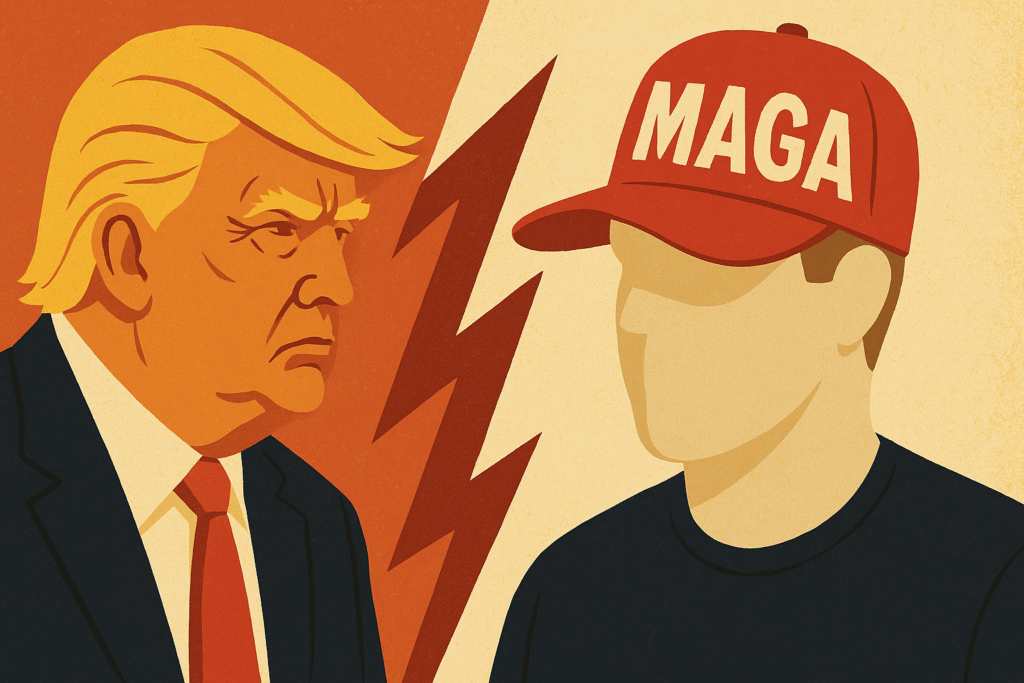growing rift is emerging between former President Donald Trump and core members of the Make America Great Again (MAGA) movement, as several policy decisions and reversals have left key conservative figures and activists increasingly dissatisfied.
The most recent flashpoint stems from widespread frustration within the MAGA base over a Justice Department memo that offered few new details on the high-profile Jeffrey Epstein case. Attorney General Pam Bondi has faced intense backlash, with some activists calling for her resignation after earlier promising new revelations and inviting right-wing influencers to the White House to discuss the case.
Chris Ager, a Republican leader from New Hampshire, acknowledged that Trump remains popular among grassroots conservatives, particularly for his stances on border security and immigration enforcement. However, he also noted significant discontent regarding unmet expectations on the Epstein investigation, especially given Bondi’s previous assurances.
“When you set high expectations and fail to meet them, disappointment follows,” Ager said, emphasizing that Bondi, rather than Trump, is bearing most of the criticism.
While some Democrats view the MAGA frustration with skepticism—attributing the Epstein case’s prominence to conspiracy theories—conservative insiders and political observers believe the broader issue lies in a growing disconnect between Trump’s governing actions and his populist promises.
Divisions Over Foreign Policy and Immigration
Discontent within the MAGA camp isn’t limited to the Epstein controversy. A series of recent policy decisions have intensified tensions, including:
- Trump’s military strike on Iran and his support for renewed arms shipments to Ukraine, which drew opposition from isolationist MAGA voices like Rep. Marjorie Taylor Greene and media personality Tucker Carlson.
- A perceived softening on immigration enforcement, after Trump praised undocumented farm and hospitality workers, alarming hardline supporters. Activists expressed frustration, stating that they elected Trump to enforce strict deportation policies, not to accommodate industries relying on undocumented labor.
Despite these concerns, many conservative voters remain loyal. For instance, a recent Pew Research Center survey found that 78% of Republican and GOP-leaning voters approved of Trump’s handling of immigration—despite wider public disapproval.
Still, some grassroots activists, like Jason Bracey of Ohio, argue that Trump’s administration is not holding employers accountable and is failing to uphold promises on deportations.
“We didn’t vote for Brooke Rollins, we voted for Trump to deport millions,” said conservative activist J.J. Carrell, criticizing the agriculture secretary’s statement that deportations will continue, but in a “strategic” way.
Musk’s Political Break and New Party Threat
Another emerging challenge comes from Elon Musk, a former Trump ally, who recently announced the creation of the “American Party.” Once a staunch supporter of Trump’s deregulatory agenda, Musk has since soured on the administration following the passage of what he called a fiscally irresponsible “big beautiful bill.”
Musk now plans to target up to 10 House and several Senate races in 2026 with significant financial backing. His new party poses a potential threat to GOP cohesion, especially in competitive districts.
Looking Ahead: 2026 and Beyond
While some political analysts view the MAGA movement’s current discontent as a growing liability for Trump, others believe it is too early to count him out. Trump’s continued influence in Congress and the courts—coupled with the lack of a viable alternative for MAGA voters—still places him at the center of Republican politics.
Ryan Bernstein, a former chief of staff to Sen. John Hoeven (R-ND), observed:
“Trump bridges the gap between traditional conservatives and the MAGA base. While both camps have their frustrations, they recognize he’s the one driving the agenda in Washington.”
Yet, there’s an underlying question of sustainability. Some insiders believe Trump could face increasing resistance post-midterms if he enters a “lame duck” phase without full Republican control of Congress.
Still, loyal supporters like Madelyn Brown from California argue that Trump is navigating a complex political landscape with the nation’s best interest in mind.
“These contradictions need context,” she said. “People should consider the strategic reasoning behind his decisions.”
As Trump navigates internal dissent, foreign policy complexities, and emerging political threats, the coming months may prove critical in determining whether his grip on the MAGA movement remains unshaken—or begins to fracture.



